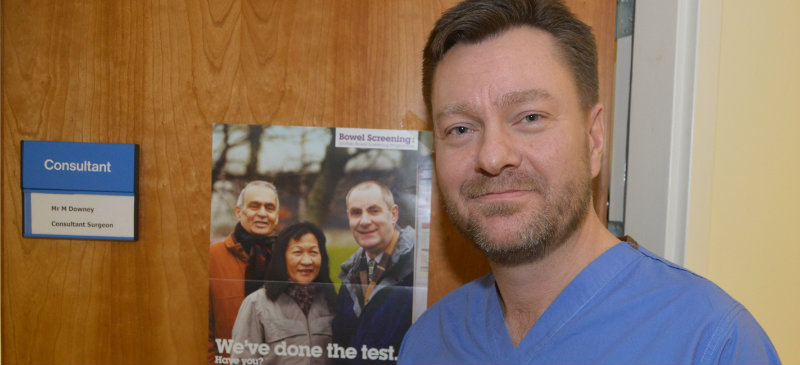The Evening Times ran an article about figures in a new report showing that women from Lanarkshire experience higher-than-average rates of stillbirth and neonatal deaths than other parts of Scotland. The region recorded the second-highest rate in Scotland with 6.42 deaths per 1,000 births. However it is worth noting that the figure of 7,096 Lanarkshire resident […]
Lanarkshire a leader with new bowel cancer detection method

A new method to improve detection of bowel cancer and avoid unnecessary medical checks has been introduced across Lanarkshire.
NHS Lanarkshire is bringing in the innovative testing kit – quantitative FIT (qFIT) – following a successful pilot in a small number of GP practices.
The test is designed specifically for people who have possible symptoms of bowel cancer, such as bleeding, altered bowel habits or pain in the tummy.
The only other health board that has used qFIT to date is NHS Tayside, which is undertaking a large pilot project funded through the Scottish Government’s £39 million Detect Cancer Early programme.
NHS Lanarkshire public health consultant Dr Jennifer Darnborough said: “We’re delighted to have the opportunity to use qFIT following our recent trial to test it out with GP practices.
“It will help us to target people most likely to have something seriously wrong for investigation and provide reassurance to others.”
Jennifer explained: “At the moment, if someone goes to their GP with bowel symptoms, they are usually sent for a colonoscopy, commonly known as a scope. It is an internal examination using a mini camera and, in most cases, the scope will show that there is nothing seriously wrong.
“The new qFIT test has been shown to accurately predict which patients are most and least likely to have anything serious wrong in their bowel by looking for hidden blood in their motions. Patients with lots of hidden blood can be fast-tracked to have a scope and those with little or no blood may be able to avoid a scope altogether.
“GPs now have a supply of the new test kits. If a patient complains of worrying bowel symptoms, they will be given a kit to take home where they can do the test in private and then send it away for processing.
“Their GP will still refer them for a hospital appointment. However, the result of the qFIT test will help doctors at the hospital decide who needs a scope and who doesn’t.
“It’s very important we do everything we can to identify bowel cancer early. It is Scotland’s third most common cancer, but if we find it early enough there’s more than a 90 per cent chance of successful treatment.”
Mr Martin Downey, colorectal surgeon at Wishaw General Hospital, added: “The launch of the qFIT test across Lanarkshire is very welcome as several thousand patients a year are referred for investigation of bowel symptoms and often automatically have a scope. However, only a small proportion of these patients turn out to have serious disease.
“Bowel symptoms often settle on their own, or can be explained by less serious causes like piles and irritable bowel syndrome. Adding in the qFIT test us to quickly work out who needs further investigations and who does not.’’
The qFIT test is for people who have symptoms and is different from the well-established bowel cancer screening test, which is routinely sent to everyone aged between 50 and 74.
Jennifer added: “It is crucial that those aged 50 to 74 continue to return their home bowel screening kit when they receive it through the post.”


Comments are closed.